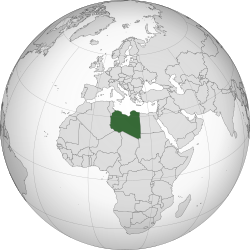Top Qs
Timeline
Chat
Perspective
LGBTQ rights in Libya
From Wikipedia, the free encyclopedia
Remove ads
Lesbian, gay, bisexual, transgender, and queer (LGBTQ) people are generally discriminated against in Libya. Homosexual activity is criminalised for both men and women within Libya, and homophobic attitudes are prevalent throughout the country.[2] Since the fall of the Gaddafi regime in 2011, the discriminatory laws regarding homosexuality in Libya remain unchanged.
This article needs additional citations for verification. (September 2011) |
Remove ads
Legality of same-sex sexual activity
Summarize
Perspective
Criminal laws
The country's criminal code prohibits all sexual activity outside of a lawful marriage. Under Article 407(4) of the Penal Code (1953), private homosexual acts between consenting adults are illegal.[3][4]
In the 1990s, the General People's Congress began to approve "purification" laws designed to enforce a harsh view of Islamic law on the population. Libyan courts were given the power to use amputation, flogging and other punishments against persons found to be violating traditional Islamic morality.[5]
In 2010, the Gay Middle East blog reported that two adult men had been charged with "indecent acts", which meant cross-dressing and homosexual conduct.[6]
Female homosexuality would also appear to be illegal, as is making any sort of public acknowledgment that a person is gay. In 2010 a French asylum case involved a Libyan girl who sought asylum after being jailed, raped and then returned to her family for a forced marriage after she made a public statement online that she was gay.[7] Vigilante executions, in lieu of the penal code, are more commonplace in ISIS-controlled territories.[8][9]
The criminal code is still technically in operation, although much of Libya is run by competing militias who may choose to execute LGBTQ people. ISIS in Libya has publicly executed men for homosexuality.[9]
Gaddafi Government
The Gaddafi government did not permit the public advocacy of LGBTQ rights. When discussed, it was always in a negative manner, in keeping with traditional Islamic morality.[10]
In 2003, Gaddafi stated that he believed that it was "impossible" to contract AIDS–HIV through unprotected, heterosexual vaginal sex.[11]
Transitional Government
The Transitional post-Gaddafi government continues to oppose LGBTQ rights. In February 2012, a Libyan delegate sparked outrage after telling a United Nations human rights panel that gay people threaten the future of the human race.[12][13]
Interim Constitution
The Transitional Constitution stipulates that Islam is the official religion and a source of law.[14] The Transitional Constitution also pledges to respect the people's right to private life.[14]
2019: Since 2019, Libya has one LGBTQ+ NGO called Kun Libya.[15] Libya's LGBTQ identifying population remains as of today under pressure to stay closeted due to the fall of the state since 2014.
Remove ads
Summary table
| Same-sex sexual activity legal | |
| Equal age of consent | |
| Anti-discrimination laws in employment only | |
| Anti-discrimination laws in the provision of goods and services | |
| Anti-discrimination laws in all other areas (incl. indirect discrimination, hate speech) | |
| Same-sex marriages | |
| Same-sex civil unions | |
| Recognition of same-sex couples | |
| Step-child adoption by same-sex couples | |
| Joint adoption by same-sex couples | |
| Gays and lesbians allowed to serve openly in the military | |
| Right to change legal gender | |
| Access to IVF for lesbians | |
| Commercial surrogacy for gay male couples | |
| MSMs allowed to donate blood |
Remove ads
See also
References
Wikiwand - on
Seamless Wikipedia browsing. On steroids.
Remove ads

